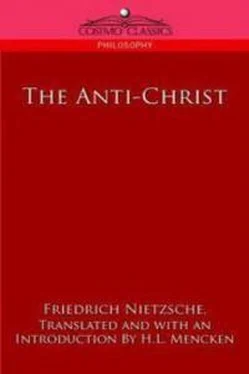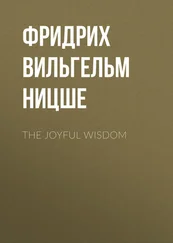The fact that the strong races of northern Europe did not repudiate this Christian god does little credit to their gift for religion—and not much more to their taste. They ought to have been able to make an end of such a moribund and worn–out product of the décadence . A curse lies upon them because they were not equal to it; they made illness, decrepitude and contradiction a part of their instincts—and since then they have not managed to create any more gods. Two thousand years have come and gone—and not a single new god! Instead, there still exists, and as if by some intrinsic right,—as if he were the ultimatum and maximum of the power to create gods, of the creator spiritus in mankind—this pitiful god of Christian monotono–theism! This hybrid image of decay, conjured up out of emptiness, contradiction and vain imagining, in which all the instincts of décadence , all the cowardices and wearinesses of the soul find their sanction!
In my condemnation of Christianity I surely hope I do no injustice to a related religion with an even larger number of believers: I allude to Buddhism . Both are to be reckoned among the nihilistic religions—they are both décadence religions—but they are separated from each other in a very remarkable way. For the fact that he is able to compare them at all the critic of Christianity is indebted to the scholars of India.—Buddhism is a hundred times as realistic as Christianity—it is part of its living heritage that it is able to face problems objectively and coolly; it is the product of long centuries of philosophical speculation. The concept, "god," was already disposed of before it appeared. Buddhism is the only genuinely positive religion to be encountered in history, and this applies even to its epistemology (which is a strict phenomenalism). It does not speak of a "struggle with sin," but, yielding to reality, of the "struggle with suffering." Sharply differentiating itself from Christianity, it puts the self–deception that lies in moral concepts behind it; it is, in my phrase, beyond good and evil.—The two physiological facts upon which it grounds itself and upon which it bestows its chief attention are: first, an excessive sensitiveness to sensation, which manifests itself as a refined susceptibility to pain, and secondly , an extraordinary spirituality, a too protracted concern with concepts and logical procedures, under the influence of which the instinct of personality has yielded to a notion of the "impersonal." (—Both of these states will be familiar to a few of my readers, the objectivists, by experience, as they are to me). These physiological states produced a depression , and Buddha tried to combat it by hygienic measures. Against it he prescribed a life in the open, a life of travel; moderation in eating and a careful selection of foods; caution in the use of intoxicants; the same caution in arousing any of the passions that foster a bilious habit and heat the blood; finally, no worry , either on one's own account or on account of others. He encourages ideas that make for either quiet contentment or good cheer—he finds means to combat ideas of other sorts. He understands good, the state of goodness, as something which promotes health. Prayer is not included, and neither is asceticism . There is no categorical imperative nor any disciplines, even within the walls of a monastery (—it is always possible to leave—). These things would have been simply means of increasing the excessive sensitiveness above mentioned. For the same reason he does not advocate any conflict with unbelievers; his teaching is antagonistic to nothing so much as to revenge, aversion, ressentiment (—"enmity never brings an end to enmity": the moving refrain of all Buddhism….) And in all this he was right, for it is precisely these passions which, in view of his main regiminal purpose, are unhealthful . The mental fatigue that he observes, already plainly displayed in too much "objectivity" (that is, in the individual's loss of interest in himself, in loss of balance and of "egoism"), he combats by strong efforts to lead even the spiritual interests back to the ego . In Buddha's teaching egoism is a duty. The "one thing needful," the question "how can you be delivered from suffering," regulates and determines the whole spiritual diet. (—Perhaps one will here recall that Athenian who also declared war upon pure "scientificality," to wit, Socrates, who also elevated egoism to the estate of a morality).
The things necessary to Buddhism are a very mild climate, customs of great gentleness and liberality, and no militarism; moreover, it must get its start among the higher and better educated classes. Cheerfulness, quiet and the absence of desire are the chief desiderata, and they are attained . Buddhism is not a religion in which perfection is merely an object of aspiration: perfection is actually normal.—
Under Christianity the instincts of the subjugated and the oppressed come to the fore: it is only those who are at the bottom who seek their salvation in it. Here the prevailing pastime, the favourite remedy for boredom is the discussion of sin, self–criticism, the inquisition of conscience; here the emotion produced by power (called "God") is pumped up (by prayer); here the highest good is regarded as unattainable, as a gift, as "grace." Here, too, open dealing is lacking; concealment and the darkened room are Christian. Here body is despised and hygiene is denounced as sensual; the church even ranges itself against cleanliness (—the first Christian order after the banishment of the Moors closed the public baths, of which there were 270 in Cordova alone). Christian, too, is a certain cruelty toward one's self and toward others; hatred of unbelievers; the will to persecute. Sombre and disquieting ideas are in the foreground; the most esteemed states of mind, bearing the most respectable names, are epileptoid; the diet is so regulated as to engender morbid symptoms and over–stimulate the nerves. Christian, again, is all deadly enmity to the rulers of the earth, to the "aristocratic"—along with a sort of secret rivalry with them (—one resigns one's "body" to them; one wants only one's "soul"…). And Christian is all hatred of the intellect, of pride, of courage, of freedom, of intellectual libertinage ; Christian is all hatred of the senses, of joy in the senses, of joy in general….
When Christianity departed from its native soil, that of the lowest orders, the underworld of the ancient world, and began seeking power among barbarian peoples, it no longer had to deal with exhausted men, but with men still inwardly savage and capable of self–torture—in brief, strong men, but bungled men. Here, unlike in the case of the Buddhists, the cause of discontent with self, suffering through self, is not merely a general sensitiveness and susceptibility to pain, but, on the contrary, an inordinate thirst for inflicting pain on others, a tendency to obtain subjective satisfaction in hostile deeds and ideas. Christianity had to embrace barbaric concepts and valuations in order to obtain mastery over barbarians: of such sort, for example, are the sacrifices of the first–born, the drinking of blood as a sacrament, the disdain of the intellect and of culture; torture in all its forms, whether bodily or not; the whole pomp of the cult. Buddhism is a religion for peoples in a further state of development, for races that have become kind, gentle and over–spiritualized (—Europe is not yet ripe for it—): it is a summons that takes them back to peace and cheerfulness, to a careful rationing of the spirit, to a certain hardening of the body. Christianity aims at mastering beasts of prey ; its modus operandi is to make them ill —to make feeble is the Christian recipe for taming, for " civilizing ." Buddhism is a religion for the closing, over–wearied stages of civilization. Christianity appears before civilization has so much as begun—under certain circumstances it lays the very foundations thereof.
Читать дальше











